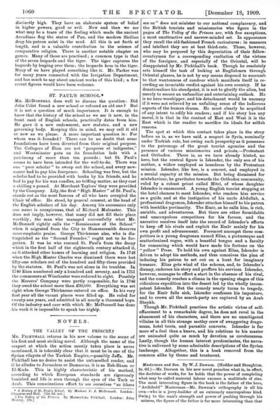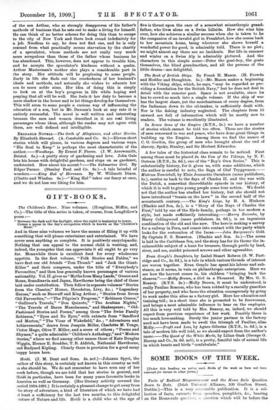Mast erman and Son. By W. J. Dawson. (Hodder and
Stoughton. 3s. 6d.)—Mr. Dawson in his new novel preaches what is, in effect, the doctrine of works, for he holds that the power of completing what may be called material labour excuses a multitude of sins. The most interesting figure in the book is the father of the hero, " Archibold" Masterman—Mr. Dawson's orthography is all his own—who is a jerry-builder of an extremely unscrupulous kind. Owing to the man's strength and power of pushing through his
usiness, the figure of the father is far more interesting than that of the son Arthur, who so strongly disapproves of his father's methods of business that he sets out to make a living for himself. He can think of no better scheme for doing this than to escape to the city of New York and there look round indefinitely for a job. Needless to say, he does not find one, and he is only rescued from what practically means starvation by the charity of a speculator, whose methods are not really very much more scrupulous than those of the father whose business he has abandoned. This, however, does not appear to trouble him, and he accepts the speculator's kindness without a qualm. Arthur Masterman's mother also plays a considerable part in the story. Her attitude will be perplexing to some people. Early in life she finds out the crookedness of her husband's ideals and methods, and naturally she wishes to educate her son to more noble aims. Her idea of doing this is simply to look on at the boy's progress in life while hoping and praying that all will be well. She feels it her duty to become a mere shadow in the house and to let things develop for themselves. This will seem to some people a curious way of influencing the education of a son, but in Mr. Dawson's book at any rate it is entirely successful. The novel is well written and interesting because the men and women described in it are real living personages whose ideas, although the reader may not agree with them, are well defined and intelligible.



















































 Previous page
Previous page